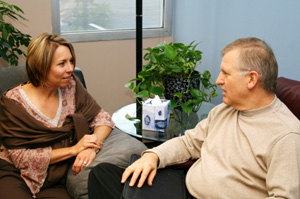 A recent article at Good Therapy may make it seem like Adventure Therapy is a new treatment modality for men, but in fact, Adventure Therapy has been around in some form for more than a century and has been used to treat women, teens, and families, as well as men. Traditionally, men are not as drawn to talk therapy as women are. Simple discomfort with the process can make it less effective. However, my practice, which allows clients much control over their own process, draws in many more men than I have seen in other settings, and at least half of my clients are men. Feeling personally in control is only one of the characteristics of Adventure Therapy that is appealing to men.
A recent article at Good Therapy may make it seem like Adventure Therapy is a new treatment modality for men, but in fact, Adventure Therapy has been around in some form for more than a century and has been used to treat women, teens, and families, as well as men. Traditionally, men are not as drawn to talk therapy as women are. Simple discomfort with the process can make it less effective. However, my practice, which allows clients much control over their own process, draws in many more men than I have seen in other settings, and at least half of my clients are men. Feeling personally in control is only one of the characteristics of Adventure Therapy that is appealing to men.
Adventure Therapy includes group games, problem solving tasks, trust activities, and indoor and outdoor adventures such as camping, rock climbing, canoeing, sailing, etc. It generally involves the benefits of group therapy while allowing participants to process individually and share in their own time both during and in between group processing sessions. Adventure Therapy often includes some perceived physical or psychological risk such as danger of physical harm or risk of embarrassment, which can help clients invest in treatment and experience more intense positive emotions when a task is completed. Based on a conglomeration of theories of several well-known psychologists, including Alfred Adler, Albert Ellis, Milton Erickson, William Glasser, Carl Jung, Abraham Maslow, Jean Piaget, Carl Rogers, B.F. Skinner, Fritz Perls, and Viktor Frankl, Adventure Therapy can be defined as a cognitive-behavioral-affective approach which utilizes humanistic existential understandings. As a practicing professional, I very much appreciate this holistic theoretical approach.
(more…)







 ure on unfinished emotional business; and learning new ways to cope without resorting to food”. Just that statement could be overwhelming with all the difficult things that are included. One issue many have with
ure on unfinished emotional business; and learning new ways to cope without resorting to food”. Just that statement could be overwhelming with all the difficult things that are included. One issue many have with